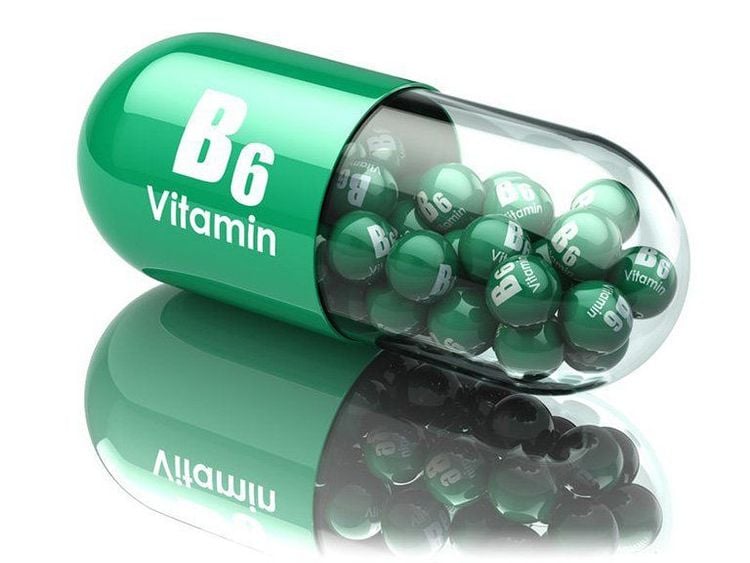This is an automatically translated article.
Vitamin B6 plays an important role in human physical and psychological function. In particular, this vitamin helps people maintain a healthy nervous system. However, in which case vitamin B6 is indicated for the baby is a question that many parents are interested in. This article will answer this question and give you the most in-depth look at vitamin B6.
1. What is the role of vitamin B6?
Vitamin B6 known as pyridoxine, is a water-soluble vitamin that the body needs for metabolism, nervous system functions, water-soluble vitamins, the immune system, and the conversion of amino acids and vitamins. other.
According to the Human Metabolism Database (HMDB) and the Natural Medicines Comprehensive Database (NMCD), vitamin B6 is required for:
Amino acid, carbohydrate and lipid metabolism Keep hormonal balance balance potassium and sodium levels Production of various neurotransmitters Proper immune system function Red blood cell production Reducing homocysteine levels Skin health In the body, vitamin B6 is converted to the coenzyme pyridoxal phosphate. This compound is needed for many different metabolic functions in the body.
Some of the roles of this coenzyme include breaking down amino acids, converting tryptophan to vitamin B3 (niacin) and synthesizing neurotransmitters in the central nervous system, including serotonin, epinephrine, dopamine, and Gamma aminobutyric acid. (GABA) .
Pyridoxine helps cells better absorb cyanocobalamin (vitamin B12). It also helps in the production of cells of the immune system and promotes the production of red blood cells.
In addition, vitamin B6 is necessary for the production of heme, a component of hemoglobin. Hemoglobin is the compound in red blood cells that carries oxygen from the lungs to body tissues.

Vitamin B6 chỉ định dùng cho một số trường hợp nhất định
2. In which case is Vitamin B6 indicated for the baby?
Vitamin B6 (pyridoxine, pyridoxal, pyridoxamine) is an essential vitamin for the maintenance of a stable function of the nervous system, immune system, red blood cell metabolism and many other functions in the body of children. Therefore, vitamin B6 is indicated for children in the following cases:
Children with vitamin B6 deficiency and malabsorption syndrome Children with primary tuberculosis who need to be treated with Isoniazid prophylaxis (an antagonist of vitamin B6) also have May be deficient in vitamin B6 The nursing infant has frequent convulsions, irritability, gastrointestinal disturbances that may appear as early as the first week after birth The child has peripheral neuritis The child has dermatitis (cheilitis, glossitis, glossitis, etc.) increased sebaceous glands around the nose - eyes - mouth) Children with small red blood cell anemia Children with numbness in the distal extremities (hands, feet, legs) Children with signs of fatigue, depression, vitamin b6 is prescribed for children. young . Vitamin B6 is water-soluble, but that doesn't mean it's safe for children. Before giving vitamin B6 to a child or any other food supplement, parents should consult a pediatrician.
To diagnose your child with vitamin B6 deficiency, doctors will need some basic blood tests to make a final diagnosis.
Recommended daily allowance of vitamin B6 in children:
0.1 mg (adequate amount) for infants 0-7 months of age 0.3 mg (adequate amount) for infants 7-12 months 0.5 mg (RDA) for children 1-3 years 0.6 mg for children 4-8 years 1 mg for children 9-13 years 1.2 mg for girls 14-18 years 1.3 mg for boys aged 14-18 years

Trước khi chỉ định vitamin B6 cho trẻ, cha mẹ nên tham khảo ý kiến của bác sĩ chuyên khoa nhi.
3. The dangers of inappropriate vitamin B6 supplementation for children
Unusual behavior Dr. Arnold Brenner of the Department of Pediatrics at Sinai Hospital in Baltimore USA has studied many children with hyperactive brain dysfunction, known as ADD and ADHD. In an article published in the Journal of People with Learning Disabilities, he said that the condition of some children who responded positively to thiamine supplements was significantly worsened when they received additional vitamin B6. Brenner's research suggests that motor neurone dysfunction syndrome has many causes, including vitamin deficiency and dependence on drugs or vitamins.
Neuropathy Too much vitamin B6 can damage nerves in the hands and feet. This type of neuropathy is often associated with taking supplements that contain a lot of vitamin B6. This neuropathy is reversible with discontinuation of the supplements, according to the National Institutes of Health's Office of Dietary Supplements.
Convulsions Pyridoxine-dependent convulsions of the neonate can occur when the mother takes high doses of B6 or if the infant is genetically dependent on pyridoxine. According to a Nature Standards Collaboration monograph published at MayoClinic.com, neonatal seizures due to pyridoxine dependence can be controlled with intravenous doses of pyridoxine provided by a healthcare professional. . The first dose of pyridoxine in an infant may cause low muscle tone or dyspnea, conditions that require immediate neonatal treatment.
Muscle weakness Decreased muscle tone can be caused by high doses of vitamin B6 used by the mother during pregnancy. Symptoms can occur at birth if the baby is treated with pyridoxine for seizures.
Ingestion of Vitamin B6 may cause nausea, vomiting, abdominal pain or loss of appetite in children and adults.
Other negative effects on children Vitamin B6 may have other negative effects on children, such as headache, light sensitivity, drowsiness, tingling, chest pain and rash on the skin. If parents notice their child experiencing these symptoms, they should stop giving their child vitamin B6 and contact a doctor.
Overdose and toxicity Extremely toxic cases can cause swelling of the lips and throat, numbness of the extremities and vomiting. Symptoms of an allergic reaction include difficulty breathing, closing of the throat, swelling of the lips, tongue, or face, and a rash. Parents should stop giving their child vitamin B6 immediately and seek emergency medical attention if a child experiences any of these symptoms or reactions.
Vitamin B6 plays an important role in human physical and psychological function. In particular, this vitamin helps people maintain a healthy nervous system. However, vitamin B6 is indicated for children only in cases where it is really necessary, so it is not recommended to supplement without consulting a specialist.
In addition to dietary supplements, parents can give their children support foods containing vitamin B6 and essential micro-minerals such as zinc, lysine, chromium, selenium, ... to help fully meet their needs. nutritional needs in children. At the same time, these essential vitamins also support digestion, enhance nutrient absorption, improve anorexia, and help children eat better.
For more nutritional knowledge and child care for each age, parents should regularly visit the website vimec.com and make an appointment with the leading doctors, pediatric and nutrition experts of the National General Hospital. Vinmec when needing advice on children's health.













